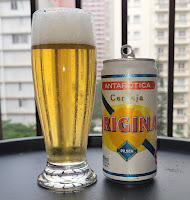 São Paulo has excellent supermarkets, in the giant French style, though with more tropical fruit than I've ever seen stacked anywhere. The beer selection tends to be mixed, and naturally is dominated by the multinationals, namely AB InBev and Heineken, including their locally brewed versions of European brands (Spaten is everywhere) and the pseudo-craft cash-ins.
São Paulo has excellent supermarkets, in the giant French style, though with more tropical fruit than I've ever seen stacked anywhere. The beer selection tends to be mixed, and naturally is dominated by the multinationals, namely AB InBev and Heineken, including their locally brewed versions of European brands (Spaten is everywhere) and the pseudo-craft cash-ins.I opened my account with Antarctica Cerveja Original from the local minimarket, chosen solely for the delightfully retro branding. A 269ml can cost the princely sum of about €0.60. Though it's very pale, it's a full 5% ABV and has a decent malt heft, giving it a chewy texture and white-bread flavour. The romance is short-lived. There's very little else going on here, and no proper hops to speak of. When it warms, and on a summer's day in Brazil it does that very quickly, there's a growing higher-alcohol heat, almost to solvent level. I can see why they chose such a small portion size. For something very basic from AB InBev's Brazilian arm, it's still better than I thought it was going to be. It's not terrible, and that's good enough to be going on with.
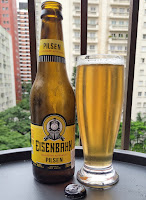 Heineken's answer, apart from the plentiful amount of its flagship pilsner, is Eisenbahn Pilsen. If there was a shortage of hops in the previous one, there's a downright famine here. The predominant flavour is concentrated dry malt extract or, to those not as familiar with shortcut homebrew recipes as I am, the inside of Maltesers. There is a little bit of Saaz-y grass in the aroma, but no more that you'd find in, say, Heineken itself, and none of that in the taste. It gets a bit sickly quite quickly, in a way that a 4.8% ABV pils shouldn't. And while I'm getting the digs in, the head retention is non-existent too. AB InBev wins this particular Battle of the Bastards.
Heineken's answer, apart from the plentiful amount of its flagship pilsner, is Eisenbahn Pilsen. If there was a shortage of hops in the previous one, there's a downright famine here. The predominant flavour is concentrated dry malt extract or, to those not as familiar with shortcut homebrew recipes as I am, the inside of Maltesers. There is a little bit of Saaz-y grass in the aroma, but no more that you'd find in, say, Heineken itself, and none of that in the taste. It gets a bit sickly quite quickly, in a way that a 4.8% ABV pils shouldn't. And while I'm getting the digs in, the head retention is non-existent too. AB InBev wins this particular Battle of the Bastards. But we stick with Sweet Lady H for another Eisenbahn: Session IPA. These aren't usually as amber as this, and the flavour is once again heavily malt-laden, though more like toffee and treacle than pure extract. The hops are layered on to this but don't really integrate with it. There's a sharply acidic bitterness up front, fading to a gentler lemon rind effect. The aftertaste, too, has this concentrated, Jif Lemon citrus, and none of it's subtle. It is helped by a little tannic dryness, which softens the blow from the hops and prevents the crystal malt side from turning cloying or sticky. It's still very much an industrial brewery's idea of a session IPA. There's a lack of freshness and zing, suggesting that it has been thoroughly pasteurised and rendered stable enough for ambient supermarket shelves in a tropical country. I don't know much about the brand's history, or whether it was ever truly independent, but I get a real sense of post-takeover Goose Island from this: trying to give the focus groups what they want, but missing the human element in doing it.
But we stick with Sweet Lady H for another Eisenbahn: Session IPA. These aren't usually as amber as this, and the flavour is once again heavily malt-laden, though more like toffee and treacle than pure extract. The hops are layered on to this but don't really integrate with it. There's a sharply acidic bitterness up front, fading to a gentler lemon rind effect. The aftertaste, too, has this concentrated, Jif Lemon citrus, and none of it's subtle. It is helped by a little tannic dryness, which softens the blow from the hops and prevents the crystal malt side from turning cloying or sticky. It's still very much an industrial brewery's idea of a session IPA. There's a lack of freshness and zing, suggesting that it has been thoroughly pasteurised and rendered stable enough for ambient supermarket shelves in a tropical country. I don't know much about the brand's history, or whether it was ever truly independent, but I get a real sense of post-takeover Goose Island from this: trying to give the focus groups what they want, but missing the human element in doing it.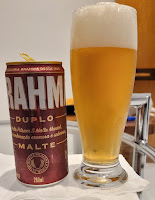 AB InBev's Brazilian flagship is, of course, Brahma, a beer which is brewed and available far beyond Brazil. Locally, there's also a variant called Brahma Duplo Malte, in its distinctive maroon can. Despite the name, it's actually slightly weaker than standard Brahma, the name referencing the use of Pilsner and Munich malt, rather than whatever floor sweepings the other one has for fermentables. It's your standard pale gold of a macro lager and has a tinny hop-extract aroma. There is a decent heft to the texture, almost syrupy, but there's almost no flavour, only a very plain cream cracker or water biscuit crispness. This is as inoffensive as they come. I guess they can validly claim it's a showcase for lager made from malt, but then, that should really be every lager.
AB InBev's Brazilian flagship is, of course, Brahma, a beer which is brewed and available far beyond Brazil. Locally, there's also a variant called Brahma Duplo Malte, in its distinctive maroon can. Despite the name, it's actually slightly weaker than standard Brahma, the name referencing the use of Pilsner and Munich malt, rather than whatever floor sweepings the other one has for fermentables. It's your standard pale gold of a macro lager and has a tinny hop-extract aroma. There is a decent heft to the texture, almost syrupy, but there's almost no flavour, only a very plain cream cracker or water biscuit crispness. This is as inoffensive as they come. I guess they can validly claim it's a showcase for lager made from malt, but then, that should really be every lager. That's the multinationals, but independents, large and small, also get a bit of a look-in at the supermarket.
That's the multinationals, but independents, large and small, also get a bit of a look-in at the supermarket.Praya is a Rio-based beer brand, though appears to come from a contracted production brewery in São Paulo. There's a longneck lager and a witbier but the flagship is the "Receita Clássica", a blonde ale of 5.3% ABV. It's fairly basic stuff, lightly fruity from the warm fermentation, with notes of dried banana. This is set on a dry cereal base and is fully fizzed up, giving it a decent amount of crispness, by contrast. That's about your lot, however: there are no further esters, making it more English-style than Belgian, and while it has points in common with lager, it doesn't quite have the same refreshing cleanness. I'm guessing it's brewed to order to be bland, more about the retro branding than the liquid inside.
 The custom bottle and gilded label suggested to me that the makers of Cidade Imperial Helles have a bit of money behind them. It's pretty standard for the spec: 5.2% ABV and a wholesome clear golden colour with decent head retention. The aroma is spot-on too, all fluffy white bread and subtle honey. And the flavour is clean, almost to the point of absence, with just a hint of crusty loaf and a very mild leafy green hop contribution. A big and smooth mouthfeel is what keeps it from seeming bland. While I never tried the version of Spaten that's presumably brewed locally, this beer has a lot in common with the Bavarian original, in a good way: Helles done precisely correctly.
The custom bottle and gilded label suggested to me that the makers of Cidade Imperial Helles have a bit of money behind them. It's pretty standard for the spec: 5.2% ABV and a wholesome clear golden colour with decent head retention. The aroma is spot-on too, all fluffy white bread and subtle honey. And the flavour is clean, almost to the point of absence, with just a hint of crusty loaf and a very mild leafy green hop contribution. A big and smooth mouthfeel is what keeps it from seeming bland. While I never tried the version of Spaten that's presumably brewed locally, this beer has a lot in common with the Bavarian original, in a good way: Helles done precisely correctly. What I guess is the brewery's flagship is Imperio Lager, sold by the 355ml in a green glass bottle. It's 4.7% ABV and a convincing clone of the likes of Corona, being bland and inoffensive when served exceedingly cold. I was in need of refreshment when I opened it, and it did the job perfectly during its very short active life. There's a bit of breadiness and bit of corniness, and a suggestion that if you allow it get anywhere above icebox temperature it will give you very unwelcome solvent and vegetal notes. Don't do that. While it's far from being a quality lager, I will give it points for not tasting even slightly skunked. Kudos to whatever chemicals they've used instead of hops here.
What I guess is the brewery's flagship is Imperio Lager, sold by the 355ml in a green glass bottle. It's 4.7% ABV and a convincing clone of the likes of Corona, being bland and inoffensive when served exceedingly cold. I was in need of refreshment when I opened it, and it did the job perfectly during its very short active life. There's a bit of breadiness and bit of corniness, and a suggestion that if you allow it get anywhere above icebox temperature it will give you very unwelcome solvent and vegetal notes. Don't do that. While it's far from being a quality lager, I will give it points for not tasting even slightly skunked. Kudos to whatever chemicals they've used instead of hops here. There were a few beers available from the Black Princess range, mostly Germanic styles, produced by Cervejaria Petrópolis, up Rio way. I chose Tião Bock to represent them. I wasn't sure what they meant when they said bock, but it's definitely not a purely German sense since the recipe includes rapadura, a jaggery-like unrefined sugar. Reinheitsge-nope. It's 6.5% ABV and a beautiful shade of clear bronze. The aroma is very much that of an authentic medium-dark bock, with honeyed malt in the ascendant plus a savoury seam of wilted spinach and lightly steamed broccoli beneath. The hops lose out a bit in the taste, and I'm blaming the exotic sugar for tilting the balance heavily in favour of sweetness. What was runny honey in the aroma becomes sticky toffee in the flavour. A low level of carbonation is no help when it comes to offsetting the sweet side, though the clean lager base is of considerable assistance. The end result is a pleasantly sippable dessert beer, caramel flavoured yet not cloying. It may not be exactly how the Germans would make such a thing, but I think they would find the end result tastes familiar, and good.
There were a few beers available from the Black Princess range, mostly Germanic styles, produced by Cervejaria Petrópolis, up Rio way. I chose Tião Bock to represent them. I wasn't sure what they meant when they said bock, but it's definitely not a purely German sense since the recipe includes rapadura, a jaggery-like unrefined sugar. Reinheitsge-nope. It's 6.5% ABV and a beautiful shade of clear bronze. The aroma is very much that of an authentic medium-dark bock, with honeyed malt in the ascendant plus a savoury seam of wilted spinach and lightly steamed broccoli beneath. The hops lose out a bit in the taste, and I'm blaming the exotic sugar for tilting the balance heavily in favour of sweetness. What was runny honey in the aroma becomes sticky toffee in the flavour. A low level of carbonation is no help when it comes to offsetting the sweet side, though the clean lager base is of considerable assistance. The end result is a pleasantly sippable dessert beer, caramel flavoured yet not cloying. It may not be exactly how the Germans would make such a thing, but I think they would find the end result tastes familiar, and good. Let's get some hops up in here. Brazil's fondness for bespoke can sizes continues with Aura by Hocus Pocus, also of Rio. It's a session IPA, though a whopping 5% ABV. They say it's hazy too, and it is, but only just: a nearly-clear pale yellow. The aroma is sweetly citric, like lemon curd or posset, and the texture is much lighter than I thought it would be, given the strength and the murk. The flavour is subtle, and maybe that's where the sessionability comes in: nothing about it builds or becomes difficult, and I could absolutely have consumed several in a row. There's a lightly pithy bitterness, and more tropical topnotes of mango, pineapple and passionfruit, making it the most typically Brazilian-tasting beer I'd encountered by that point. They like their hops fruity at Hocus Pocus. Only a faint echo of all that lasts into the aftertaste, making it moreish and, again, sessionable. While I've tasted many a beer among similar lines in other places, after all of the above I was glad to find that there is genuinely good stuff available from a Brazilian supermarket.
Let's get some hops up in here. Brazil's fondness for bespoke can sizes continues with Aura by Hocus Pocus, also of Rio. It's a session IPA, though a whopping 5% ABV. They say it's hazy too, and it is, but only just: a nearly-clear pale yellow. The aroma is sweetly citric, like lemon curd or posset, and the texture is much lighter than I thought it would be, given the strength and the murk. The flavour is subtle, and maybe that's where the sessionability comes in: nothing about it builds or becomes difficult, and I could absolutely have consumed several in a row. There's a lightly pithy bitterness, and more tropical topnotes of mango, pineapple and passionfruit, making it the most typically Brazilian-tasting beer I'd encountered by that point. They like their hops fruity at Hocus Pocus. Only a faint echo of all that lasts into the aftertaste, making it moreish and, again, sessionable. While I've tasted many a beer among similar lines in other places, after all of the above I was glad to find that there is genuinely good stuff available from a Brazilian supermarket. That encouraged me to pick up another Hocus Pocus beer next time out: the 7% ABV IPA called Interstellar, packaged in a 500ml bottle. They don't say anything about haze on it the label, and the flavour web points more to "Citrico" than "Frutado", but it's definitely hazy in the glass, if quite orange in colour. There's a sweet orange sherbet aroma, but it reverts to proper west-coast tropes on tasting. First it's a punchy lime bitterness, then even bitterer oily pine resin, finishing on an acidic rasp that's downright metallic. From one end to the other, that's quite a journey, and perhaps that's how it earned its name. Disappointingly for a strong beer, it doesn't feel heavy, nor leave you with any of the flavour as an aftertaste. But it's fun while it lasts, and maybe that's enough. From my bottle, I got a sense of a beer where the hops have faded a little over time, so I suspect this is one where you need to watch the dates in order to ensure an optimum experience with it, and I'm sure the ambient shelves in Carrefour don't help either.
That encouraged me to pick up another Hocus Pocus beer next time out: the 7% ABV IPA called Interstellar, packaged in a 500ml bottle. They don't say anything about haze on it the label, and the flavour web points more to "Citrico" than "Frutado", but it's definitely hazy in the glass, if quite orange in colour. There's a sweet orange sherbet aroma, but it reverts to proper west-coast tropes on tasting. First it's a punchy lime bitterness, then even bitterer oily pine resin, finishing on an acidic rasp that's downright metallic. From one end to the other, that's quite a journey, and perhaps that's how it earned its name. Disappointingly for a strong beer, it doesn't feel heavy, nor leave you with any of the flavour as an aftertaste. But it's fun while it lasts, and maybe that's enough. From my bottle, I got a sense of a beer where the hops have faded a little over time, so I suspect this is one where you need to watch the dates in order to ensure an optimum experience with it, and I'm sure the ambient shelves in Carrefour don't help either.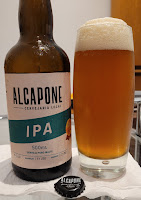 At around €4 a bottle, the next beer cost multiples of most others. Such robbery is presumably why the brewery is named after an infamous gangster. Alcapone IPA is 6.6% ABV and a murky shade of pale amber in the glass. It smells murky too: earthy and savoury, with a dollop of marmalade in amongst the dregs. There are no dregs in the flavour, I'm happy to say, but this is one of those old-fashioned craft IPAs of the sort that mostly went extinct, except possibly in eastern parts of Europe, and seemingly Brazil, well over a decade ago. There's a high malt quotient, making it taste of toffee and rye bread first, then a sweet hop perfume, all honeysuckle and jasmine, before a sterner bitterness that's part hop bitterness and part yeasty dregs. What's missing is cleanness and freshness, the sort of things that modern IPAs, when they're not designed to be hazy, have as a central feature. There's a touch of homebrew about this one. It's not awful and I didn't find any off-flavours as such, but it's not high quality either. I wasn't rushing to spring more reais on Signor Capone's beers.
At around €4 a bottle, the next beer cost multiples of most others. Such robbery is presumably why the brewery is named after an infamous gangster. Alcapone IPA is 6.6% ABV and a murky shade of pale amber in the glass. It smells murky too: earthy and savoury, with a dollop of marmalade in amongst the dregs. There are no dregs in the flavour, I'm happy to say, but this is one of those old-fashioned craft IPAs of the sort that mostly went extinct, except possibly in eastern parts of Europe, and seemingly Brazil, well over a decade ago. There's a high malt quotient, making it taste of toffee and rye bread first, then a sweet hop perfume, all honeysuckle and jasmine, before a sterner bitterness that's part hop bitterness and part yeasty dregs. What's missing is cleanness and freshness, the sort of things that modern IPAs, when they're not designed to be hazy, have as a central feature. There's a touch of homebrew about this one. It's not awful and I didn't find any off-flavours as such, but it's not high quality either. I wasn't rushing to spring more reais on Signor Capone's beers.  We return to the familiar embrace of AB InBev with Cervejaria Colorado and its Indica IPA. The 600ml bottle suggests I should follow local practice and serve it in an ice bucket for sharing, as does the 7% ABV, but whatever. This is even darker than the previous, almost brown in colour. The aroma is both sweet and resinous, suggesting another retro experience to come. It's very heavy, with a warmth that makes it feel like cough syrup, even when consumed very cold from the fridge. Flavourwise, the malt aspect is all toffee and red liquorice. The bitter side of it should be your grapefruit and your pine, but it is concentrated beyond that, coming through as aspirin or zinc. This is 1990s American-style IPA with the controls set to maximum, and it's not enjoyable as a result. While it's as flawlessly made as you'd expect from the world's biggest industrial brewer, the recipe is terrible. Maybe there's a certain thrill to be had from drinking IPA brewed in a parallel universe where haze never happened, but that's as far as the fun goes with this one.
We return to the familiar embrace of AB InBev with Cervejaria Colorado and its Indica IPA. The 600ml bottle suggests I should follow local practice and serve it in an ice bucket for sharing, as does the 7% ABV, but whatever. This is even darker than the previous, almost brown in colour. The aroma is both sweet and resinous, suggesting another retro experience to come. It's very heavy, with a warmth that makes it feel like cough syrup, even when consumed very cold from the fridge. Flavourwise, the malt aspect is all toffee and red liquorice. The bitter side of it should be your grapefruit and your pine, but it is concentrated beyond that, coming through as aspirin or zinc. This is 1990s American-style IPA with the controls set to maximum, and it's not enjoyable as a result. While it's as flawlessly made as you'd expect from the world's biggest industrial brewer, the recipe is terrible. Maybe there's a certain thrill to be had from drinking IPA brewed in a parallel universe where haze never happened, but that's as far as the fun goes with this one. Not to be outdone, Heineken Brazil has the Baden Baden brewery in São Paulo. Its IPA Maracujá is superficially similar to the Colorado one, being 6.4% ABV and amber coloured. As the name tells us, they've added passionfruit to it, so it makes sense that it wouldn't be anything like as bitter as the previous, and it's not. There's a tropical perfume in the aroma, suggesting that the fruit was added in syrupy concentrated form, and the flavour still has a decent poke of hard resinous bitterness. Caramel crystal malt adds one type of sweetness, and the perfumey fruit syrup another. While the latter fades, the malt side lasts long into the finish and aftertaste, bringing more of those very old-fashioned American IPA vibes, from when hop freshness wasn't really a factor. It's sufficiently palatable that I didn't feel ripped off, but IPA has moved on from beers like this, and with good reason.
Not to be outdone, Heineken Brazil has the Baden Baden brewery in São Paulo. Its IPA Maracujá is superficially similar to the Colorado one, being 6.4% ABV and amber coloured. As the name tells us, they've added passionfruit to it, so it makes sense that it wouldn't be anything like as bitter as the previous, and it's not. There's a tropical perfume in the aroma, suggesting that the fruit was added in syrupy concentrated form, and the flavour still has a decent poke of hard resinous bitterness. Caramel crystal malt adds one type of sweetness, and the perfumey fruit syrup another. While the latter fades, the malt side lasts long into the finish and aftertaste, bringing more of those very old-fashioned American IPA vibes, from when hop freshness wasn't really a factor. It's sufficiently palatable that I didn't feel ripped off, but IPA has moved on from beers like this, and with good reason.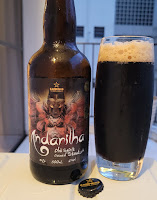 Stout is thin on the ground in Brazilian supermarkets, so I snapped up Campinas Andarilha when I saw it. This is a 6% ABV oatmeal stout, densely black and brown around the edges. The aroma is wonderfully strong, pushing out heavy black liquorice with luxurious rum-and-raisin boozy fruit added in. It's a little on the thin side for an oatmeal stout, and that does make the flavour less impactful than it could be, but it still tastes fantastic. The liquorice is a supporting player and instead it's the warming rum that takes centre stage, backed by a dry toastiness. A vanilla finish gives the impression of a barrel-aged beer, but I don't believe it is. The combination conveys wonderfully old-fashioned stout character: bitter and roasty and serious. This wasn't what I expected it to be, but I will absolutely take it.
Stout is thin on the ground in Brazilian supermarkets, so I snapped up Campinas Andarilha when I saw it. This is a 6% ABV oatmeal stout, densely black and brown around the edges. The aroma is wonderfully strong, pushing out heavy black liquorice with luxurious rum-and-raisin boozy fruit added in. It's a little on the thin side for an oatmeal stout, and that does make the flavour less impactful than it could be, but it still tastes fantastic. The liquorice is a supporting player and instead it's the warming rum that takes centre stage, backed by a dry toastiness. A vanilla finish gives the impression of a barrel-aged beer, but I don't believe it is. The combination conveys wonderfully old-fashioned stout character: bitter and roasty and serious. This wasn't what I expected it to be, but I will absolutely take it.There was plenty more from most of the above breweries and brands, but I think I got a good impression of what the mainstream looks like. There was one other set of supermarket-acquired beers that I've singled out for special treatment, and that's up next.





No comments:
Post a Comment